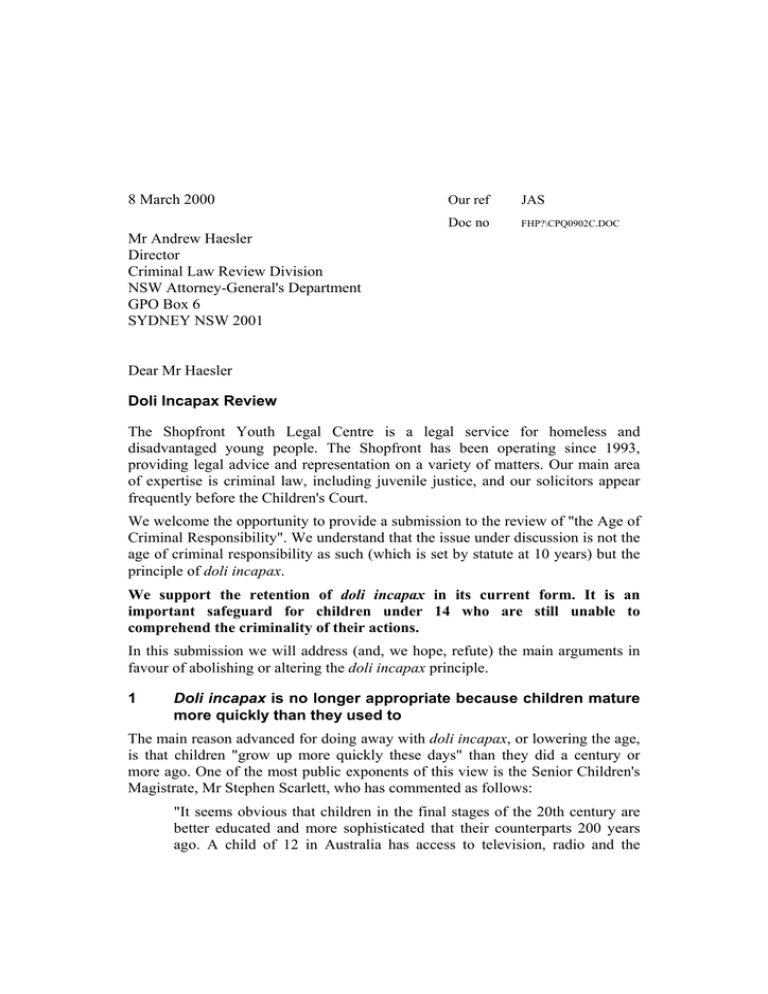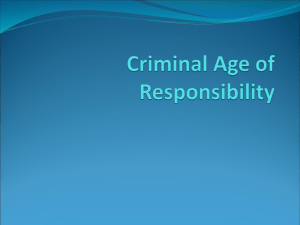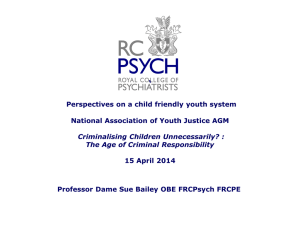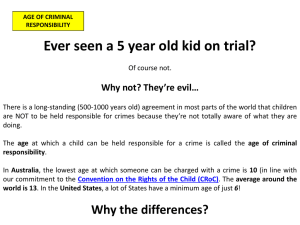8 March 2000 Mr Andrew Haesler Director
advertisement

8 March 2000 Our ref JAS Doc no FHP?\CPQ0902C.DOC Mr Andrew Haesler Director Criminal Law Review Division NSW Attorney-General's Department GPO Box 6 SYDNEY NSW 2001 Dear Mr Haesler Doli Incapax Review The Shopfront Youth Legal Centre is a legal service for homeless and disadvantaged young people. The Shopfront has been operating since 1993, providing legal advice and representation on a variety of matters. Our main area of expertise is criminal law, including juvenile justice, and our solicitors appear frequently before the Children's Court. We welcome the opportunity to provide a submission to the review of "the Age of Criminal Responsibility". We understand that the issue under discussion is not the age of criminal responsibility as such (which is set by statute at 10 years) but the principle of doli incapax. We support the retention of doli incapax in its current form. It is an important safeguard for children under 14 who are still unable to comprehend the criminality of their actions. In this submission we will address (and, we hope, refute) the main arguments in favour of abolishing or altering the doli incapax principle. 1 Doli incapax is no longer appropriate because children mature more quickly than they used to The main reason advanced for doing away with doli incapax, or lowering the age, is that children "grow up more quickly these days" than they did a century or more ago. One of the most public exponents of this view is the Senior Children's Magistrate, Mr Stephen Scarlett, who has commented as follows: "It seems obvious that children in the final stages of the 20th century are better educated and more sophisticated that their counterparts 200 years ago. A child of 12 in Australia has access to television, radio and the Internet, and has a far greater understanding of the world than a 12 year old in rural Britain in 1769."1 We believe that this argument is fallacious on several grounds: (a) Firstly, there is no evidence that compulsory education or access to mass media accelerates children's moral development. In the case of education, it has been said that: "It is also a debatable point whether being ensconced in the school system is more likely to lead to one's growing up faster than, for example, being thrust into the workplace at the age of eight (or younger) as would generally have been the case when the doctrine was developed. Twentieth Century developments, both in education and in the juvenile justice system, have sought to lengthen the process of childhood and, therefore, to make it a more fulfilling era of one's life."2 Television is often blamed for inhibiting children's moral development, by desensitising children to violence, giving children poor role models and lessening opportunities for social interaction. Similar criticisms have also been made of the Internet3. Today's children may appear more “sophisticated” than children of previous generations, but this does not necessarily mean they are sufficiently morally developed to understand the criminality of their actions. Many of our young clients appear very “streetwise”, but lack even a basic understanding of criminal responsibility. (b) Secondly, even if formal education, media and the Internet do accelerate children's moral development, children who appear before the Children’s Court do not necessarily have access to these resources. It is true that many "normal" children (from apparently stable and middleclass homes, with no obvious deficits in intelligence and education) are charged with offences. However, there is a very high proportion of disadvantaged children appearing before the Children's Court - especially among those who have multiple court appearances and/or who end up in detention. Problems faced by these children include an unstable family background (including periods of homelessness or in state care), a history of abuse, limited formal education, intellectual disability, economic and social deprivation4. Many 1 Comments made in decision on committal proceedings in the "W" case, as quoted on p8 of Hot Topics, Issue 23: Juvenile Justice, Legal Information Access Centre, July 1999 2 Charlotte Walsh, Irrational Presumptions of Rationality and Comprehension [1998] 3 Web JCLI, p4 3 See, for example, Nancy Willard, Moral Development in the Information Age, 1997, http://www.uic.edu/~lnucci/MoralEd/aotm/willard.htm 4 The link between social disadvantage and juvenile offending has been shown in a number of studies. See, for example: Crime Prevention Division, Attorney-General's Department, 1996: Juvenile Crime in New South Wales: A Review of the Literature, Chapters 3 and 4; Chris Cunneen and Rob White, Juvenile Justice: An Australian Perspective, Oxford university Press, Doli 17 April 2003 (14:15) page 2 of these children, especially in remote areas and Aboriginal communities, will not even have completed primary school, let alone have access to the Internet. A child's moral development depends on a number of factors5. The quality of parenting is, without doubt, one of the most important factors6. Children from dysfunctional family backgrounds tend to be over-represented in the juvenile justice system. This is particularly true of state wards7. It is therefore dangerous to assume that most children under 14 appearing before the Children's Court will have adequate moral development to comprehend the criminality of their actions. (c) Finally, even if the majority of 10 to 13 year olds appearing before the Children's Court are able to "distinguish right from wrong", there is a significant number who are unable to make this distinction. Children develop at vastly different rates - cognitively, emotionally, socially, and morally. Doli incapax recognises this fact and provides important protection for children whose moral development is slower than average. "(F)ar from being an outmoded survival from an earlier area, the doli incapax rule is fully consistent with our increasing knowledge of child development and learning, which tells us that children mature and learn over different time spans."8 2 The doli incapax presumption is illogical It has been argued that the presumption of doli incapax is illogical, because it assumes that a child under 14 lacks the capacity to understand the criminality of their behaviour, yet it can be refuted by evidence that a child is developmentally "normal". Even if this appears illogical, we do not believe this is a sufficient reason for doing away with the presumption. "The presumption itself is not, and never has been, completely logical; it provides a benevolent safeguard which evidence can remove."9 1995, pp108-110; Youth Justice Coalition, 1990: Kids in Justice, A Blueprint for the '90s, pp 27-28 5 For an interesting and recent discussion of the development of moral reasoning in young people, see Paolo Aleixo and Claire Norris, Personality and Moral Reasoning in Young Offenders, Personality and Individual Differences 28 (2000) 609-623 6 See, for example, Carlo, Fabes, Laible and Kupanoff, Early Adolescence and Prosocial/Moral Behavior II: The Role of Social and Contextual Influences, Journal of Early Adolescence, vol 19 No 2, May 1999, p133 at p135: "The limited evidence available on prosocial and moral development in adolescence has indicated that prosocial behaviors (sic) are fostered by supportive parenting, combined with parental practices and discipline techniques." 7 See footnote 4 above. See also Community Services Commission, The drift of children in care into the juvenile justice system, 1996; Community Services Commission, Just Solutions wards and juvenile justice, 1999. 8 Cavadino, Goodbye Doli - must we leave you? (1997) 9 Child and Family Quarterly 165, at p168. 9 Per Lord Lowry in C v DPP [1995] 2 WLR 383 at 397 Doli 17 April 2003 (14:15) page 3 There are other equally "illogical" presumptions which serve an important protective function. For example, children are presumed to lack the capacity to enter contracts which are not for their benefit. This is so even though most children in their mid-to-late teens would have no trouble understanding the implications of entering into a contract. The presumption of incapacity is rebuttable - the child can elect to affirm the contract on attaining the age of 18, or the other party can apply to a court to have the contract affirmed10. The presumption of incapacity serves as an important protection for children who do not have the requisite understanding and are vulnerable to exploitation. It has been suggested that reversing the onus of proof, and starting with a presumption that 10 to 13 year olds do have the capacity to understand criminality of their actions, would be more "logical". We do not support this suggestion. This would require children to prove they are doli incapax, and would place them in the difficult position of giving evidence of something they do not know. 3 Children need to learn the consequences of their behaviour It is often said that kids need to learn that their behaviour has consequences, and that doli incapax hinders this because it lets children "get away with" their "criminal" behaviour. We agree that children need to learn to understand the consequences of their behaviour, but we do not think that criminal sanctions are the best way of teaching this. It is now generally accepted that diverting children away from the juvenile justice system is more effective than criminal sanctions in dealing with early offending behaviour. Indeed, this has become one of the guiding principles of our juvenile justice system, and in particular of the Young Offenders Act 11. Criminal sanctions are particularly inappropriate for children who do not understand the criminality of their actions. Imposing criminal punishments on those without the requisite mens rea offends against basic principles of criminal justice. Problem behaviour from children incapable of forming a criminal intent is more appropriately addressed by parenting, educational and therapeutic strategies. 4 We do not need doli incapax because children are no longer subject to such draconian penalties It is true that children are no longer subject to the draconian penalties, such as hanging, that applied when the doli incapax presumption was developed. It is also true that the sentencing process takes into account children's vulnerability and immaturity. However, we do not believe that the sentencing process provides a sufficient safeguard to render doli incapax unnecessary. The Children's Court still has serious sentencing options, including up to two years' detention, at its disposal. For children being dealt with by superior courts 10 Minors (Property and Contracts) Act 1970 (NSW), sections 36 and 39 11 See, for example, Juvenile Justice Advisory Council, Green Paper, 1993, Future Directions for Juvenile Justice in New South Wales; NSW Government, White Paper, 1994, Breaking the Crime Cycle: New Directions for Juvenile Justice in NSW Doli 17 April 2003 (14:15) page 4 for serious charges, the potential penalties are tough indeed. Apart from Community Service Orders (where the maximum number of hours for children under 16 is less than for older children) the maximum penalty is the same regardless of the child's age. As well as criminal penalties, a child convicted of an offence may face a substantial compensation bill. If a victim of a violent offence receives an award of statutory compensation, a convicted offender will be liable to pay restitution. The maximum amount payable is $50,000, and amounts of $10,000 for nonaggravated assaults are not uncommon. The fact that the defendant was a child at the time of the offence offers no protection, nor does the fact that no conviction was recorded by the court. The only exception is where the matter was dismissed under section 33(1)(a) of the Children (Criminal Proceedings) Act or under the Young Offenders Act12. We do not support the suggestion that doli incapax be restricted to indictable offences dealt with by superior courts "according to law". We maintain that children who lack capacity to form a criminal intent should not be subject to criminal sanctions of any kind. 5 Doli incapax leads to an unreasonable number of acquittals This assertion is not borne out by evidence. As mentioned in the Criminal Law Review Division's Discussion Paper on this issue, and elaborated on in the National Children's and Youth Law Centre's submission, a very small proportion of children aged 10 to 13 plead not guilty. Statistics are not available to indicate how many of these children are actually found guilty, but anecdotal evidence suggests that the doli incapax presumption is often successfully rebutted by the prosecution. For the vast majority of children in this age group, the presumption is not even raised, because the child pleads guilty. The assertion about an unreasonable number of acquittals is often used to argue against the retention of other fundamental safeguards such as the right to silence, the presumption of innocence, or the "beyond reasonable doubt" standard of proof. To our knowledge, there is no evidence that these principles lead to an inordinate number of acquittals. In any event, the benefit in convicting a few more guilty people would be far outweighed by the cost of having the innocent convicted. 6 Doli incapax "lets children get away with murder" Again, this is a fallacious view, which is often related to the arguments about guilty children being acquitted and escaping from the consequences of their behaviour. Children who put the prosecution to proof on the doli incapax presumption do not get a "free ride". Firstly, doli incapax does not confer an immunity from prosecution. Children in the 10 to 13 year age group still have to go through court proceedings to determine their guilt or innocence. 12 See Victims Compensation Act 1996 (NSW) sections 45-58, and the definition of "conviction" in the Dictionary at the end of the Act. Doli 17 April 2003 (14:15) page 5 Secondly, to rebut the presumption, the prosecution may place a lot of evidence before the court which would not be admissible in a normal criminal trial. Such evidence may include prior criminal history and is often highly prejudicial to the child. Thirdly, children who are acquitted pursuant to doli incapax rarely walk away "scot free", particularly where serious charges are involved. Children whose behaviour is extremely violent or sexually inappropriate will usually come under the notice of the care and protection system (if they are not already). It is likely that various welfare and therapeutic measures will be put in place, and a watchful eye kept over the child's behaviour. 7 The upper age limit of 14 is arbitrary It is true that 14 is an arbitrary age limit. Indeed, it could be argued that it is too low, as there will be developmentally delayed children aged 14 or over who are still unable to form a criminal intent. However, the age of majority (18) and the age of criminal responsibility (10) are also arbitrary, and there seems little practical way of avoiding this. The advantage of doli incapax is that it is a rebuttable presumption which takes into account the evolving and differing capacities of children between the ages of 10 and 14. 8 Developmentally delayed children can rely on the Mental Health Criminal Procedure) Act for protection In some cases, children with intellectual disabilities may have charges dismissed under section 32 of the Mental Health (Criminal Procedure) Act. We concede that this provides something of a safeguard, but it is no substitute for doli incapax. Firstly, section 32 is discretionary and does not amount to an outright acquittal. Secondly, it applies to defendants who have a "mental illness, a mental condition for which treatment is available in a hospital, or a developmental disability of mind". "Developmental disability of mind" clearly includes an intellectual disability, but would probably not extend to include a child whose cognitive functioning is not significantly impaired but whose delayed moral development places them in the doli incapax category. 9 Summary and recommendations We believe that calls for the abolition or alteration of doli incapax are based on arguments which are ill-conceived and not supported by evidence. We would also point out that there are often calls for increased criminal responsibility and tougher penalties for children, without a corresponding extension of rights in such areas as voting, driving, and making major life decisions. We support the retention of doli incapax in its current form. It would be preferable for it to be enacted into legislation. If legislation is enacted, we would support wording that makes it clear that the child must be able to distinguish between "criminality" and "naughtiness". Doli 17 April 2003 (14:15) page 6 In Australian jurisdictions which have enacted doli incapax, the legislation requires the prosecution to prove that the child had the capacity to know that he or she "ought not to" do or make a particular act or omission13. We do not believe this goes far enough. Read literally, this could still enable the conviction of a child without the requisite criminal intent. For example, most fiveyear-olds often know that they "ought not to" hit their siblings or draw on the walls, yet this does not mean that they possess any criminal intent. Finally, we have had the benefit of reading the submissions prepared by the National Children's and Youth Law Centre, the NSW Legal Aid Commission, NSW Young Lawyers and the NSW Law Society. We endorse those submissions. Yours faithfully THE SHOPFRONT YOUTH LEGAL CENTRE Jane Sanders Principal Solicitor Gabrielle McKinnon Solicitor Aaron Tang Volunteer Law Student Joanna Fishman Volunteer Solicitor Sarah Laing Legal Assistant 13 We refer to the relevant statutes in Western Australia, Queensland, Tasmania, and the Northern Territory, as cited in the submission of the National Children's and Youth Law Centre. Doli 17 April 2003 (14:15) page 7






